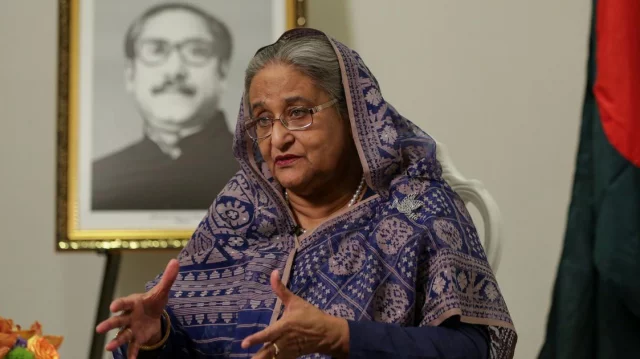Sheikh Hasina Wazed has been a leading figure in Bangladeshi politics for over forty years. As the daughter of Bangladesh’s first President, Sheikh Mujibur Rahman, she was recognized by Forbes in 2016 as the 36th most powerful woman in the world. Her early life was marked by adversity, including hiding during the violent 1970 elections and coping with the assassination of her family in 1975. She returned to Bangladesh in 1981 to lead the Awami League Party, founded by her father in 1949.

Source: Moneycontrol
Full Story:
Hasina’s dedication to democracy often led to house arrests. Her first term as Prime Minister, from 1996 to 2001, was historic as she was the first Bangladeshi Prime Minister to complete a full term since independence. One of her key achievements was signing the Chittagong Hill Tracts Peace Accord in 1997, which ended years of conflict with tribal groups.
In 2009, Hasina skillfully managed the Bangladesh Rifles revolt by negotiating with rebels. Known for her strong advocacy for women and children’s rights, she has worked tirelessly to enhance their roles in politics. Her efforts earned her global recognition, including the UNESCO Peace Tree Award in 2014 and the Planet 50-50 Champion award from UN-Women in 2016.
Under Hasina’s leadership, Bangladesh made significant strides. The country graduated from least developed country (LDC) status in 2018 and aims to achieve middle-income status by 2021. The GDP grew from 5.04% in 2009 to 7.86% in 2018, with projections indicating Bangladesh could become a developed country by 2024.

Source: Dhaka Tribune
Hasina is also celebrated for her humanitarian efforts. She earned the nickname “Mother of Humanity” for providing refuge to over 750,000 Rohingya refugees from Myanmar, an act that won her the Mother of Humanity Social Work Award in 2018.
Additionally, Hasina’s leadership has led to increased food production and life expectancy. The percentage of people living in poverty decreased from 19% to 9%, and life expectancy rose from 69.3 years in 2008 to 72.8 years in 2017. The Ashrayan Project, initiated by Hasina, has provided housing and self-reliance training to thousands displaced by natural disasters. This ongoing project includes plans to build new housing, including a tower named after Hasina.



















































































